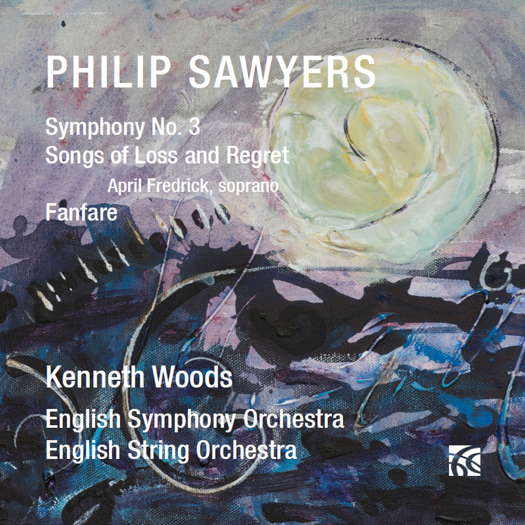- Virgil Thomson
- John Browning
- Roger Argente
- Dvorák
- E J Moeran
- Ernest Tomlinson
- Radu Lupu
- Hernan Constantino
Artificial Prejudices
There is no raising of the eyebrows when one learns that a composer was born in, let's say, Paris or Vienna. Indeed the fact of being born at a certain time in a certain place and among a certain milieu can make becoming a composer seem more inevitable than merely propitious. What then is one to make of a composer who when barely out of his teens composes some of the most radical and radically sumptuous music one has ever heard. Furthermore when he does this as a citizen of a country that has literally no tradition of orchestral music, indeed in a country where at the time he was creating these marvels there was not a single professional symphony orchestra in existence. Such is the case with Portuguese composer Luís de Freitas Branco and specifically two extraordinary orchestral pieces he completed in the second decade of the last century.
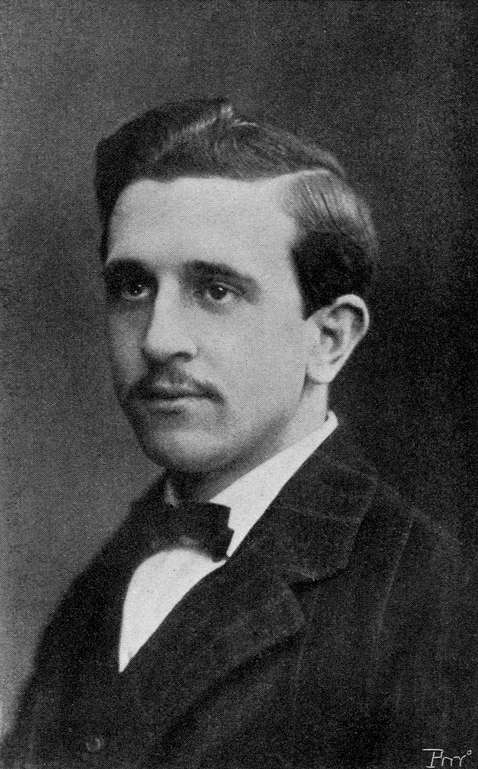
Luís de Freitas Branco (1890-1955) in 1911
I do not wish to exaggerate Freitas Branco's vox clamans in deserto case. Although he was born somewhere that was decidedly off the radar as regards European classical music in the late nineteenth century, he had from birth, unlike most of his compatriots, that one great and all-important advantage that could mollify, if not totally eliminate, any seeming obstacles to becoming a composer: namely money. He was precociously and enormously talented but his family's wealth meant that a Shakespeare in the jungle he was not. By virtue of his aristocratic inheritance he was able to study in Berlin and Paris but what he managed to create from the melding of the various influences he received, especially at such a young age, is utterly unique and remarkable. It has far less to do with his family connections than with pure individual genius.
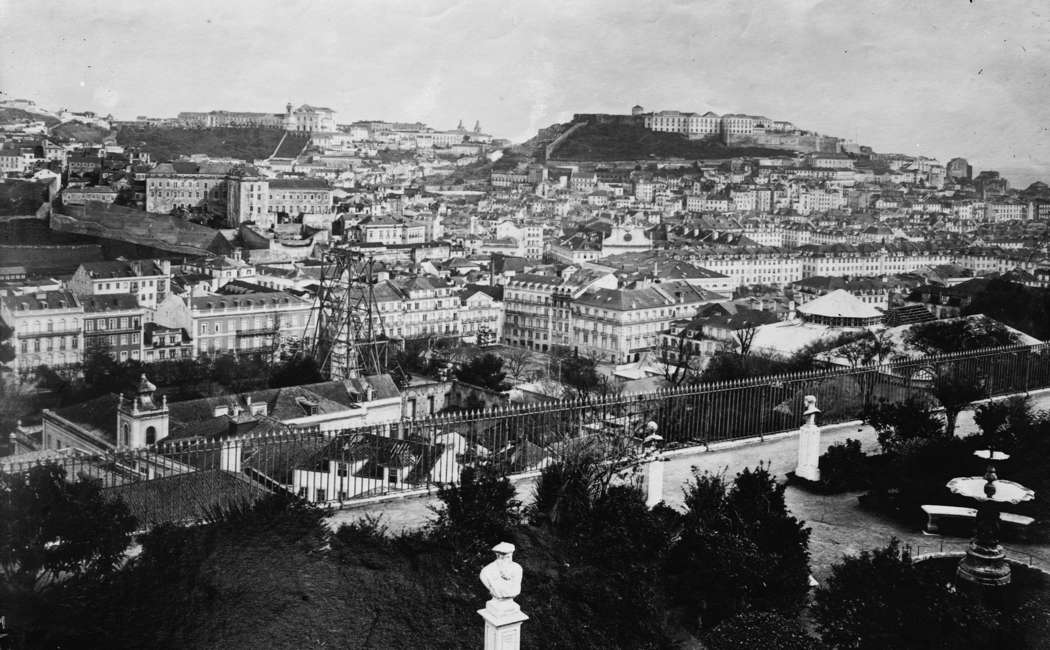
A 1919 city view of Lisbon in Portugal
According to composer and conductor Álvaro Cassuto the orchestral piece Os paraisos artificiais which Freitas Branco completed in 1910 is considered by most Portuguese musicians and musicologists as his masterpiece. For all the reasons I cited in the opening paragraph, it is an extraordinary, wonderful piece, but for me, and maybe this is because I am not a good enough musician to judge sufficiently well, this piece is not nearly as extraordinary or uniquely individual as two pieces which Freitas Branco composed in the following three years.
In 1911 he composed three symphonic fragments titled Tentações de São Frei Gil. It is a work based on the tale of a thirteenth century Dominican which is basically a Portuguese version of Faust. Freitas Branco took his inspiration from a poem of the same name by António Correia de Oliveira published four years previously. This work again shows notable influences. The second fragment is clearly indebted to Sibelius with notable echoes of The Swan of Tuonela and the final piece is comparable to late Rimsky-Korsakov. That said the Preludio that opens the work is quite something else.
Listen — Luís de Freitas Branco: Preludio (Tentações de São Frei Gil) (extract) :
Although here again the shadow of Debussy can be felt, what Freitas Branco does with it is quite breathtaking. It sounds almost like Pelléas heard through the prism of the golden age of Portuguese Renaissance polyphony - Debussy mixed with Manuel Cardoso to create something utterly new and scintillating. Freitas Branco created this incredible edifice of sound. The confident sweep and the very idiosyncratic orchestration not to mention the modal harmonies is quite unlike anything else I know. And as far as I know this magical piece has yet to receive a CD recording, a Portuguese LP from the 1980s is the only version commercially available to the best of my knowledge. However even this piece pales in comparison to what Freitas Branco produced two years later.
One of his outstanding features as an artist especially when young was his enormously potent imagination and it was another child of a young and rich imagination that inspired his masterpiece. Vathek - written by William Beckford when he was more or less the same age as Freitas Branco when the composer created his musical interpretation of the piece - is an extraordinarily opulent and voluptuous tale of a caliph who makes a Faustian pact that ends when he receives his comeuppance for all his egotistical wrongdoing. There is a twist in that, as Borges pointed out, the hell in which Vathek is condemned for eternity was not merely a place of punishment but also of temptation into which Vathek descended willingly.
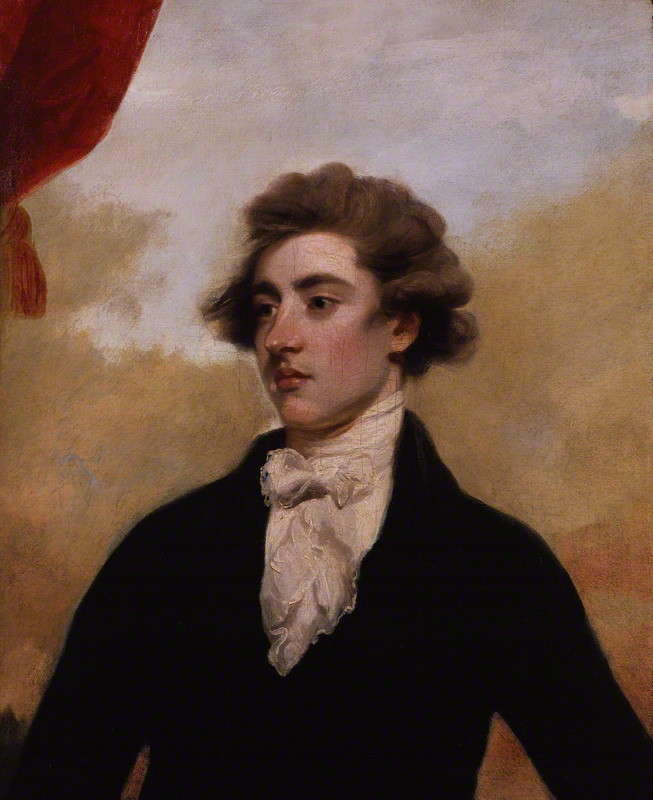
English novelist William Beckford (1760-1844)
Owing to this exceptional piece of music and knowing that Vathek (the book) was very highly rated by Borges, who I rate very highly, I read it with high expectations that went sorely unfulfilled. Its seemingly endless font of imaginative detail for inventing and describing places, people, sensations, delights and terrors can not be denied but none of that for me was enough to distract me from the fact that the story is basically kid's stuff. Likewise the supposedly terrible denouement did not fill me with even the slightest twinge of terror. Beckford's writing and storytelling abilities are extremely second rate when compared to Poe or Stevenson for example. In the nineteenth and even early twentieth century I can appreciate how it would have had a greater grip on readers emotions and imaginations but sadly I grew up in a world where since at least the First World War nothing in fiction can be as remotely terrifying as the multiple and manifold horrors of modern reality - a dilemma with which the whole artistic project, in whatever form, has had to wrestle for a century or more. What art work that aims or attempts to terrify can get close to those photos of when Auschwitz was first liberated? As Robert Hughes said, in the Somme valley language broke its back.
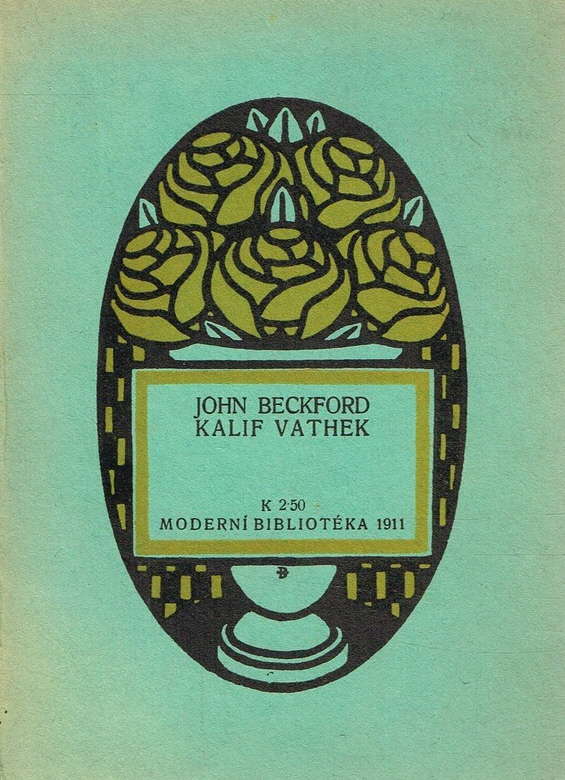
The first Czech edition (1911) of the novel 'Vathek'
I shall let Luís himself describe what he took from Beckford's book and what he aimed to depict. The following comes from the manuscript score:
Vathek, a Caliph whose magnificence exceeded that of all of his predecessors, dissatisfied by the Palace built by his father in the city of Samarah, added to it five other palaces, each one of which was destined to satisfy each of the human senses. The first was dedicated to the sense of 'taste', and the tables were always covered by the most delicate kinds of food. The palace was called the 'Eternal Feast'. The second palace, the 'Temple of the Melody', was inhabited by the best musicians and poets of his time, who performed without ceasing. The third palace, called 'Delight of the Eyes', was dedicated to the most rare paintings and statues, collected from all over the World. The fourth palace, or 'Palace of the Perfumes', was filled with aromatic lamps which were lit all day, even during sunlight. The fifth palace, or 'Refuge of Happiness', was filled with maidens, beautiful and kind, who never faltered in providing wellbeing for the Caliph's guests.
In the score each one of these palaces inspired a variation of a theme we first hear on a solo bassoon. Before we hear the theme though the piece starts off with a brass fanfare not so dissimilar to the start of the Tentações de São Frei Gil with the notable difference of much increased polytonality but it shares that edifice like monumentality of the earlier work. Between the short introduction of the theme and the first variation proper we have a Prologue which gives us our first hint of how utterly strange and special this symphonic poem is going to be: a pseudo-oriental melodic passage is followed by the most dissonant chord ever heard in Portuguese music until that time.
Listen — Luís de Freitas Branco: Prologue (Vathek)
(extract) Budapest Philarmonic Orchestra / András Kórodi. ℗ 1985 Portugalsom :
Just to prove that it was not a horrible mistake by the musicians and conductor or that the composer had not completely lost his mind, we hear it again at the end of the Prologue. Sounds like this are exactly what caused the famous Skandalkonzert in Vienna's Musikverein the very same year and bouts of fisticuffs two months later at the Parisian premiere of Le Sacre du printemps. If neither the Parisian public nor the oh so cultured Viennese were ready for such sounds you can only imagine how their Portuguese counterparts would have felt. In hindsight maybe it was a good thing for the health of all concerned that Vathek had to wait half a century for its first complete performance in Lisbon.
The first variation, depicting the palace dedicated to the pleasures of taste, is another of Freitas Branco's Russian inspired creations. The second dedicated to the pleasures of the ear is a mélange of Tchaikovsky, Sibelius and Strauss, a contemplative piece compared to the bustling first variation. It is quite beautiful and once again demonstrates Freitas Branco's precocious talent for orchestration, but it wears its influences too obviously on its sleeve. Then comes the third variation. Right here and now I can not think of any single piece of Western music, not even Gesualdo's madrigals or Schoenberg's Gurre-Lieder that contains such extreme contrasts within a single piece, as that of the juxtaposition of the second and third variations in Vathek.
Listen — Luís de Freitas Branco: Transition from Variation 2 to Variation 3 (Vathek)
(extract) Budapest Philarmonic Orchestra / András Kórodi. ℗ 1985 Portugalsom :
We leave behind a world similar to that of Romeo and Juliet and enter into a foreboding hush from which emerge eight cellos playing an extremely dissonant melody which is superimposed in fugato by eight violas, then sixteen second violins, sixteen first violins followed by the rest of the orchestra until we build up to a fugue in fifty nine parts creating one of the most exhilarating textures in all music. Then everything stops before a final outburst for full orchestra, which Álvaro Cassuto speculates may be the composer laughing at his prospective audience. From what I have surmised of Luís de Freitas Branco the man, I find this hard to swallow and if, with this finale to the third variation, he wanted to represent anything concrete I would suggest it is Vathek's scornful contempt of his own fate or his boastful dismissal of the warning 'Woe to the rash mortal who seeks to know that of which he should remain ignorant, and to undertake that which surpasses his power'.
The fourth variation is a magical perfumed garden formed from flute and harp arabesques that grows to include the full orchestra in magnificent climaxes, the whole thing makes so many modern film soundtracks seem paltry and lacklustre in comparison. The last variation, dedicated as it is to the pleasures of the flesh, seems quite incongruous. Although it contains some languorous moments most of it seems more like one of the dances from a De Falla ballet. Rhythmic pleasures perhaps. The work finishes with an Epilogue which is the longest piece in the entire symphonic poem. It is a shadowy suggestive spell of a piece. Full of flickering sounds and evocative atmosphere. It finishes in maybe Freitas Branco's most magnificent cathedralesque climax, the kind of rousing monumental music he was so adept at. It is also incongruous in that Beckford's eponymous protagonist ends up being subjected to eternal torture and damnation. Perhaps Freitas Branco wanted to celebrate good conquering evil.
Vathek was written in 1913, a year in which so much great music, even Debussy's Jeux, inevitably I suppose had to huddle in the enormous shadow cast by Stravinsky's Rite of Spring. That said, for me Vathek holds its own compared to any symphonic poem written at any time or in any place. It stands as one of the greatest monuments to the utterly free play of human imagination and most especially to the uniqueness of a young imagination before the so-called real world forces it into its predictable strictures. Indeed with the notable exception of a sonata for cello and piano that he wrote around the same time as Vathek, Freitas Branco never again wrote anything comparable in its sheer idiosyncrasy and unique genius. Presumably he understood, or was made to understand, that his early scores could and would only produce repugnance and ridicule among his peers and so, desirous of an audience and recognition he changed his style markedly. In his later life he composed many fine, wonderfully crafted but very conservative pieces, including his four symphonies, but nothing to rival in sheer originality what he wrote in his early twenties. This was a fate shared by many other composers, indeed artists in general, in the twentieth century, owing to the fact that the violent and rapid changes in modern reality, and the artistic response to them, was moving at a rate with which most of the public were unable or unprepared to keep up with, or rejected wholeheartedly in their dire need to hold on to some familiar certainties, sense of permanent values and beliefs (however dubious or false) in a world of vertiginous flux, relativity, uncertainty and change.
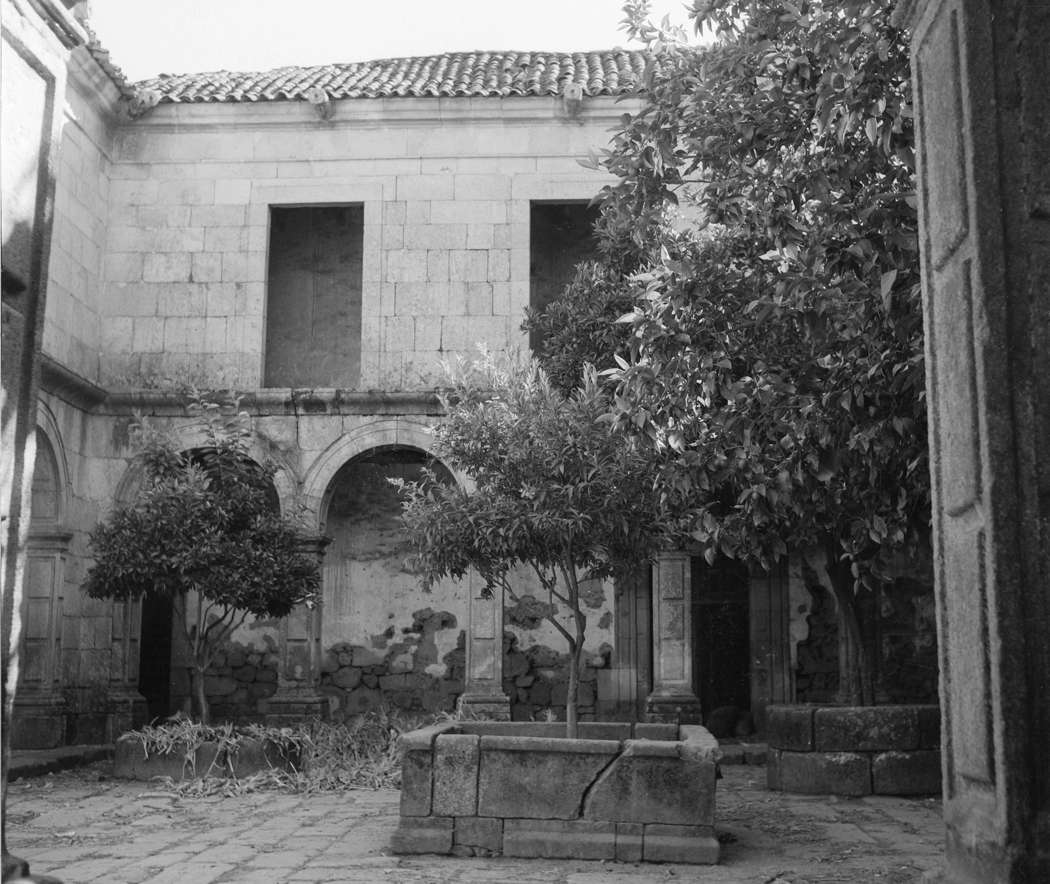
The Convento de Nossa Senhora de Maceira Dão, Vila Garcia, Portugal (1960s/70s)
In the introductory essay I wrote to this series I mentioned how for me many composers' reputations suffer and have suffered due to their place of birth. I ask myself how would Freitas Branco be considered today had he been French or German or Russian, like so many of his influences, and not Portuguese? But then again I wonder, had he been the recipient of a typical Parisian or Viennese musical education of the time would he ever have been so radical in his thinking or composing? Would his professors of composition have beaten any crazy (wrong) ideas out of him long before he ever entertained them? Who knows? Perhaps. Either way I am forever grateful that Luís de Freitas Branco was not French or German or Russian but uniquely Portuguese, just like a certain poet born in his home town on the Atlantic coast a couple of years before Luis de Freitas Branco.
Copyright © 14 October 2022
Robert McCarney,
León, Spain

ECHOES OF OBLIVION - FURTHER INFORMATION
TWENTIETH CENTURY CLASSICAL MUSIC


